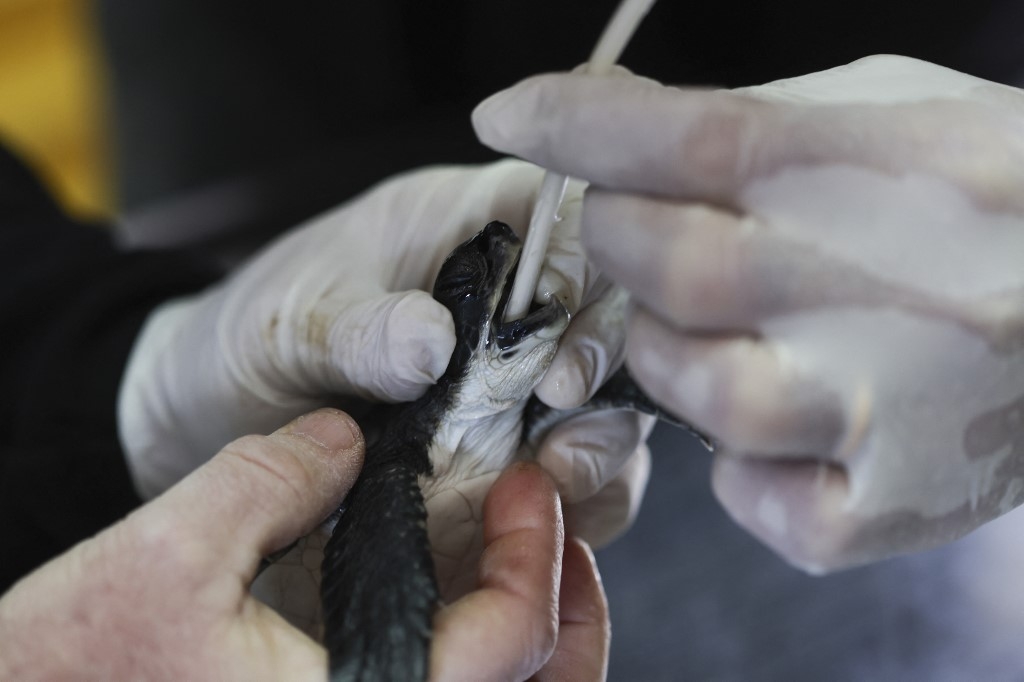Israel's beaches blackened by tar after offshore oil spill

Israeli authorities are trying to find the ship responsible for an oil spill that drenched much of its Mediterranean shoreline with tar, an environmental blow that will take months or years to clean up, officials have said.
Thousands of volunteers gathered on Sunday to remove clumps of sticky black refuse from the beaches.
Israel’s military said it was deploying thousands of soldiers to help with the effort, according to Reuters. Authorities warned members of the public to keep away from the beaches until further notice.
Powerful winds and unusually high waves pummelled Israel's entire Mediterranean coastline on Tuesday and Wednesday, with tonnes of tar staining 160km of beaches along Israel's Mediterranean coast from Gaza to Lebanon.
The winter storm made it harder to see the tar approaching and deal with it at sea, Israeli officials said.
New MEE newsletter: Jerusalem Dispatch
Sign up to get the latest insights and analysis on Israel-Palestine, alongside Turkey Unpacked and other MEE newsletters
Environmental groups called it a disaster. Attesting to the cost to wildlife, they posted pictures of tar-covered turtles.
Israel could take legal action
Together with European agencies, Israel was looking for a possible source for an 11 February oil spill from a ship passing about 50km from shore. Satellite images and modelling of wave movements were helping to narrow the search.
The environmental protection minister, Gila Gamliel, said that nine ships that were in the area at the time were being looked at.
“There is a more than reasonable chance that we will be able to locate the specific ship,” she told Ynet TV.
If found, Israel could take legal action. One course would be to sue insurance companies for compensation to help deal with the ecological fallout, she said, which could cost tens of millions of shekels.
'This event and similar ones around the world show us how crucial it is to wean ourselves from these polluting fuels, and shift to renewable energy'
- Gila Gamliel, Israeli environment minister
"We need to look to the future. This event and similar ones around the world show us how crucial it is to wean ourselves from these polluting fuels, and shift to renewable energy," Gamliel later said in remarks relayed by Prime Minister Benjamin Netanyahu's office.
All but two of Israel's 100 or so public Mediterranean beaches were closed for the winter, with the bathing season due to open on 20 March.
"Our goal is to open the beaches on time," Gamliel said.
At the Gador nature reserve between Haifa and Tel Aviv, Nature and Parks Authority ranger Gil Haviv lifted tar debris from the sand, placing it in a garbage bag.
"It's a huge disaster, words can't describe it," he told AFP.
His colleague, ranger Noam Matsri, said they had to rush to pick up as much of the tar as possible before the weather helped it diffuse into the sand.
"As long as it's cold, it's okay, when it's going to be warm, it's going to stick, it's going to liquify," he said.
Late last week a 55ft-long fin whale was found washed up on a beach in southern Israel. The Nature and Parks Authority said on Sunday that an autopsy had found oil-based material in the whale’s body, and that further tests were pending.
This article is available in French on Middle East Eye French edition.
Middle East Eye delivers independent and unrivalled coverage and analysis of the Middle East, North Africa and beyond. To learn more about republishing this content and the associated fees, please fill out this form. More about MEE can be found here.




